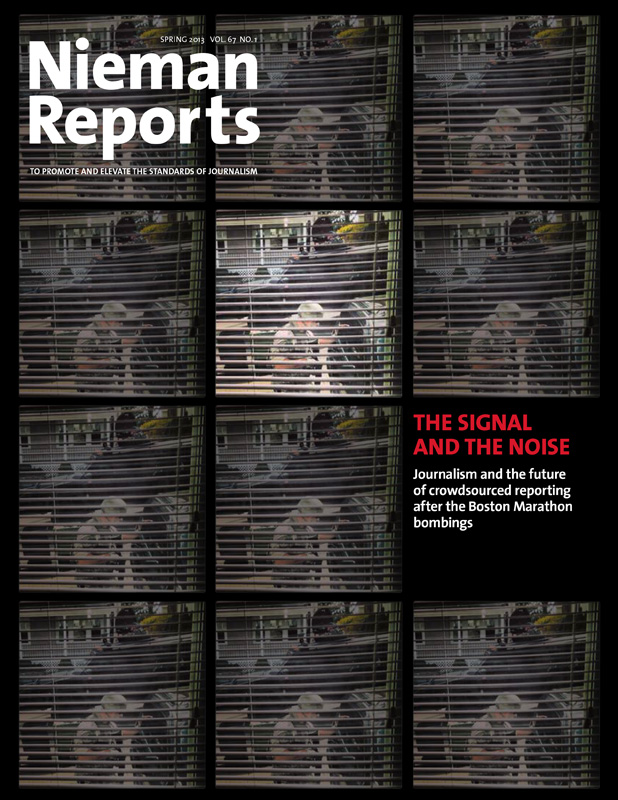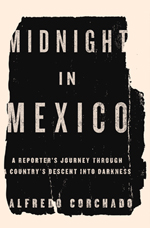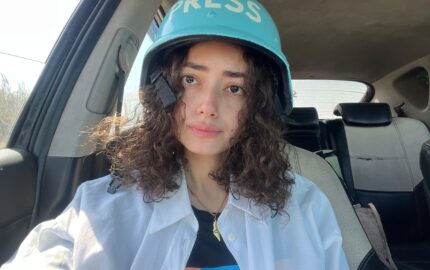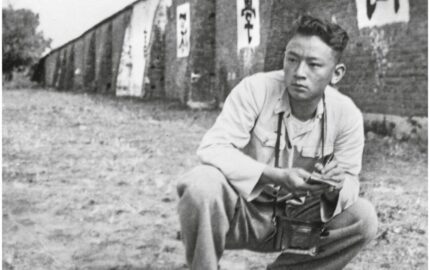Dallas Morning News Mexico bureau chief Alfredo Corchado, NF '09, recently sat down at Lippmann House to discuss his year as a fellow and his new book, "Midnight in Mexico."
An edited version of this interview appeared in print.
TRANSCRIPT
What was it like coming to Cambridge after covering the violence in Mexico for so long?
I think it was a year of an internal struggle in me. I think the biggest thing I realized right away was how I could walk down Kirkland Street or Harvard Square and not be looking over my shoulder. That was like this huge relief because in Mexico … I felt like I was just aging by the second, the sense of stress, the sense of fear. Here, obviously, I really believe that they weren't going to be chopping people's heads off on Massachusetts avenue, you know? You felt much more comfortable, much more relaxed. But at the same time there were two things that were happening.
One was, obviously, the violence against journalists in Mexico, but also the industry of journalism going through a hard time, difficult time. One of the regrets I have is that any time I was able to have a chance I would go back to Mexico, whether it was a long weekend, or part of that spring break I went back to Mexico. Because I was trying to make sure I had a job after the fellowship was over.
But at the same time the silence in Mexico was growing among my colleagues. More and more regions were being threatened, more and more journalists were deciding that they really couldn't compete. There was no one to turn to. They couldn't really turn to the government for protection. Oftentimes they turned to us as American correspondents or just as foreign correspondents.
I felt so, I guess, wedded, or committed to the story that it was difficult to walk away completely. But I think I walked away enough to know, to be able to better define the lines. Before, crossing the line really didn't make much sense to me there either, and I think being here actually helped me define the lines much better, so that when I went back to Mexico I knew, for example, what story was worth taking a risk or not worth taking a risk.
What motivates you to keep doing what you do?
I've thought about that a lot. I thought about that when I was here. There was this internal struggle. Do I go back? Do I maybe get a job at one of the coffee shops here, and just stay on, and become an intern with Nieman or something? But I think what really inspires me, what really motivates me, what got me into journalism in the first place, was the idea of giving others a voice. I know that sounds really corny, and all of that, but I was a migrant worker as a kid in California, and grew up. Having a TV crew come up to you at the age of 13 and saying, "Do you think there's enough water? Do you guys have enough toilets? Do you have enough breaks?" That had a huge impact on me.
It was like someone wanted to give me a voice. That always has inspired me to do what I do, the idea of giving others a voice. But, it's also, at a time when Mexico's trying to transform itself. You have very courageous people, amid the bloodshed, amid the destruction, amid the pain.
You have victims, you have parents, who somehow get up again. They go to work. They take their kids to baseball practice or to soccer practice. They are committed to trying to change that society, make it a better country.
Their stories is really what move me, and their stories is really what inspires me, and motivates me to continue doing what I do.
Why is it important for the American audience to understand Mexico? What role can journalists play to help bridge the cultures?
I think a lot of correspondents in Mexico would tell you that their mission, their goal, is to try to be a bridge maker. Not just because it's noble or because you're trying to educate both countries, but because you really have no more options. We are so intertwined as two countries that in the end you really can't choose anymore. You have the Mexico south, 112 million people, and then you have the Mexico abroad. There's a little Mexico in many, many communities throughout the United States.
But we haven't … Maybe November 6th of last year began the process of realizing, "Wait a minute, who are these people who are now voting?" Maybe that's what it takes, is people will now be able to put the two and two together.
But there's no other country, and I can say this convincingly. I'm completely convinced about this. There's no other country that influences the United States more on a day to day basis than Mexico. Whether it's policy, whether it's the food, whether it's the music you listen to. It's all there and there are little bits of Mexico that are spreading fast throughout the United States.
This happens at a time when the journalism industry's going through a difficult time. We had a bureau, at one point, in the heyday of the Dallas Morning News, just to give you an example, a staff of 13 people. We had drivers, we had translators, we had a TV bureau there, we had a business reporter, we had a immigration, me, a tourism, a cultural … We're down to one and that's me and I'm here with you right now. [laughs] I'm always constantly looking.
That's really the story of journalism in Mexico. On the one side you have all this silence that's growing throughout the country and then you have the crisis. Then you have these incredible economic pulls that are just pulling these two countries together. Beyond the violence, there's another Mexico that's being formed or transformed. Sadly, I think very few people here know about that, and that's a huge, huge void.
Has social media helped fill the void in Mexican journalism?
We've seen a lot of reports anecdotally I've covered some of these where you see more and more communities who are relying on Twitter, for example, or Facebook. A city like Nuevo Laredo, just right on the Texas border, right across from Laredo, Texas, you have mothers who in the afternoons will tweet and say, "Such and such street looks calm," because they're picking up their kids from school and they're want to know what streets do they take to go home. That is happening. I think Mexico has one of the fastest growing segments in social media, more and more people on Facebook, more and more people on Twitter. Yet the cartels are also pretty savvy. I don't know to what extent they've been able to tap into Twitter or Facebook, but they've certainly send messages to people that that's a no no.
Just a few weeks ago, there was a video that appeared with a hooded gunman, got a gun next to this guy. The guy is holding a page, it's like a Facebook page, and saying, "This too can happen to you. If you continue posting it on Facebook, you're gonna face the same fate that I'm about to face."
Gun goes off, the video goes off, we don't know whether that was a fake video. There was no way to confirm that, but the message was clear, stop using Facebook, stop using Twitter. I think it does scare people at one level. We've seen bloggers who have been decapitated, again, in the city of Nuevo Laredo. It's all aimed at … Some people call it a terrorism war, some people call it a drug war, whatever you want to call it people are dying and people are being terrorized in certain communities.
The message is, "We control this place, and we control information." In the end the war on drug traffic and over drugs, it really comes down to information, who controls the information? Who controls the information and controls the distribution routes. While it is a tool, I think some people also are using it pretty cautiously. But, the Arab Spring was a huge wake up call for Mexico, too, and an inspiration for many.
What was the process of writing the book like?
Hands down, it has to be the hardest thing I ever did in my life. [laughs] I always thought, "Maybe someday I will do a book." My mother, to her credit, has always kept all my notepads since I was a college reporter. She even built this little house, or something, a little shack, and she has all my notepads there. I always thought that I would do that, but maybe 10 years from now, and something more of a journalistic chronicle. What it ended up being, and what Penguin wanted, which was really the most difficult thing, was to pull me away from the safety of the sidelines as a reporter and made it much more into the personal narrative.
I think that was the hardest thing, learning to be comfortable in your skin as a person, not so much as a reporter.
It was difficult interviewing my parents, interviewing my father. There is an incident in the book that explains why we left Mexico, why we came to the United States, and that was really the death of my sister. Was two years old, drowned. I was the one watching her, so it was like a big traumatic experience, not just for me, but obviously for the whole family.
Going back to my mother and taking my mother back to Mexico, to this little town, and reliving that was difficult. There was all these little parts that, in the end, I keep saying I think it made me discover really who I am and what I am. Maybe there will be many other people who can identify with that.
Were there concerns about safety?
One of the challenges of writing this book was doing everything I can to make sure that people are not hurt after the book comes out.
There were at least, I think, two anonymous sources who I sat with throughout the whole process. The deal was that I would make sure that they vetted and that they went through it and that they felt comfortable. Because there is that … I still have that doubt in my mind of, "Will something happen when the book comes out?"
There's an informant that I write about who is an arms dealer. We sat down, she went through it, make sure that there will certain little things that I had to take out to make sure that they didn't trace her.
There's a federal agent who read through a lot of the stuff, not a lot, but everything where that person we've mentioned, to make sure that he felt comfortable. Not to give too much of the book, but there is one character that I think a lot of people are concerned about, and when I started writing this book I didn't think this person would still be alive when the book comes out.
Here we are in March and he's still alive, so he keeps me awake a lot. February 5th of this year was the cutoff date, was when I told the sources, "If by this date this person's not dead, I will go back and meet with you guys separately, and you guys can cross out whatever you want." On February 5th, I wasn't even sure I had a book, because this guy was still alive. One of them said, "You know what? I may ask you to take me out," which would have been really devastating for the book, and he said, "Let me have 24 hours to think about it."
Called me up after 24 hours, met with his family, kids, came back and said, "I need this line out, I need that line out, but in general, the bottom line is that this is not about you, this is not about me. It's a bigger story, so let's go with it." I think in some ways, I am much more concerned for their safety than maybe they are. I think some of these people have kind of come to terms with the situation.
What sort of reaction are you expecting from the people you wrote about?
There is a thing in the back of my mind where I do think. My friends, my girlfriend … Not my parents yet because I have not yet sat down with them and said everything to them. But there is a sense that if something does happen, if we do get the wrong signs, that I might have to leave Mexico. I think that's the hardest thing about this book, coming to terms with that, especially now that it will be in Spanish.
But, again I went back and forth, back and forth, and I think when I talked to those sources and they read those parts there were some changes to try to protect them. But their message to me was, "This is bigger than you. This is bigger than me. We want to make sure this story gets out." I think that's when I realized I'm going to go forward.




